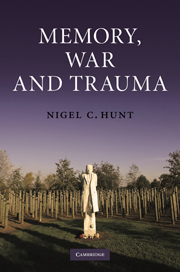Book contents
- Frontmatter
- Contents
- Preface
- 1 Background and purpose
- 2 Historical perspective
- 3 Methods and ethics
- 4 Current theory: post-traumatic stress disorder
- 5 Approaches to understanding trauma
- 6 Positive outcomes of traumatic experiences
- 7 Memory and history
- 8 Personal narrative and social discourse
- 9 Illustrating narrative as a scientific technique: the role of social support
- 10 Ageing, trauma and memory
- 11 Literature and trauma
- 12 Memorialisation and commemoration
- 13 Battlefield tours
- 14 Conclusions and future directions
- References
- Index
2 - Historical perspective
Published online by Cambridge University Press: 05 June 2012
- Frontmatter
- Contents
- Preface
- 1 Background and purpose
- 2 Historical perspective
- 3 Methods and ethics
- 4 Current theory: post-traumatic stress disorder
- 5 Approaches to understanding trauma
- 6 Positive outcomes of traumatic experiences
- 7 Memory and history
- 8 Personal narrative and social discourse
- 9 Illustrating narrative as a scientific technique: the role of social support
- 10 Ageing, trauma and memory
- 11 Literature and trauma
- 12 Memorialisation and commemoration
- 13 Battlefield tours
- 14 Conclusions and future directions
- References
- Index
Summary
The effects of traumatic war experience have been recorded throughout history (Trimble, 1985), particularly through literature. Evidence of flashbacks, dissociation and startle response might be seen as witchcraft (Rosen, 1960) or acts of God (Ellenberger, 1970). In the western world the evidence can be traced back at least as far as the Bible, though it was not until the nineteenth century that the scientific study of the psychological responses to war experience was considered in any detail. Furthermore, the terminology used to describe trauma is very recent, so we have to be cautious about interpreting what authors from the past were saying. We should try to avoid over- or under-interpreting information. People in previous eras did not only describe things differently – they were different. They were brought up to behave in particular ways, they were used to death in a way that few people in the West are now used to it, and they had different attitudes and beliefs. The past is another world.
The Bible describes the siege of Jericho, where all the soldiers of Israel marched around the city walls for six days, and where on the seventh day trumpeters blew their rams' horns as the army marched around the walls seven times, then all the people shouted, and this led to the walls of the city falling down. The story is not meant to be taken literally, but is an illustration of how traumatic loud noises can be.
- Type
- Chapter
- Information
- Memory, War and Trauma , pp. 14 - 27Publisher: Cambridge University PressPrint publication year: 2010



